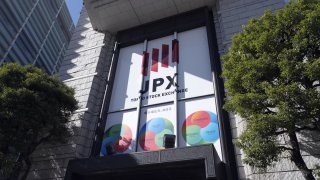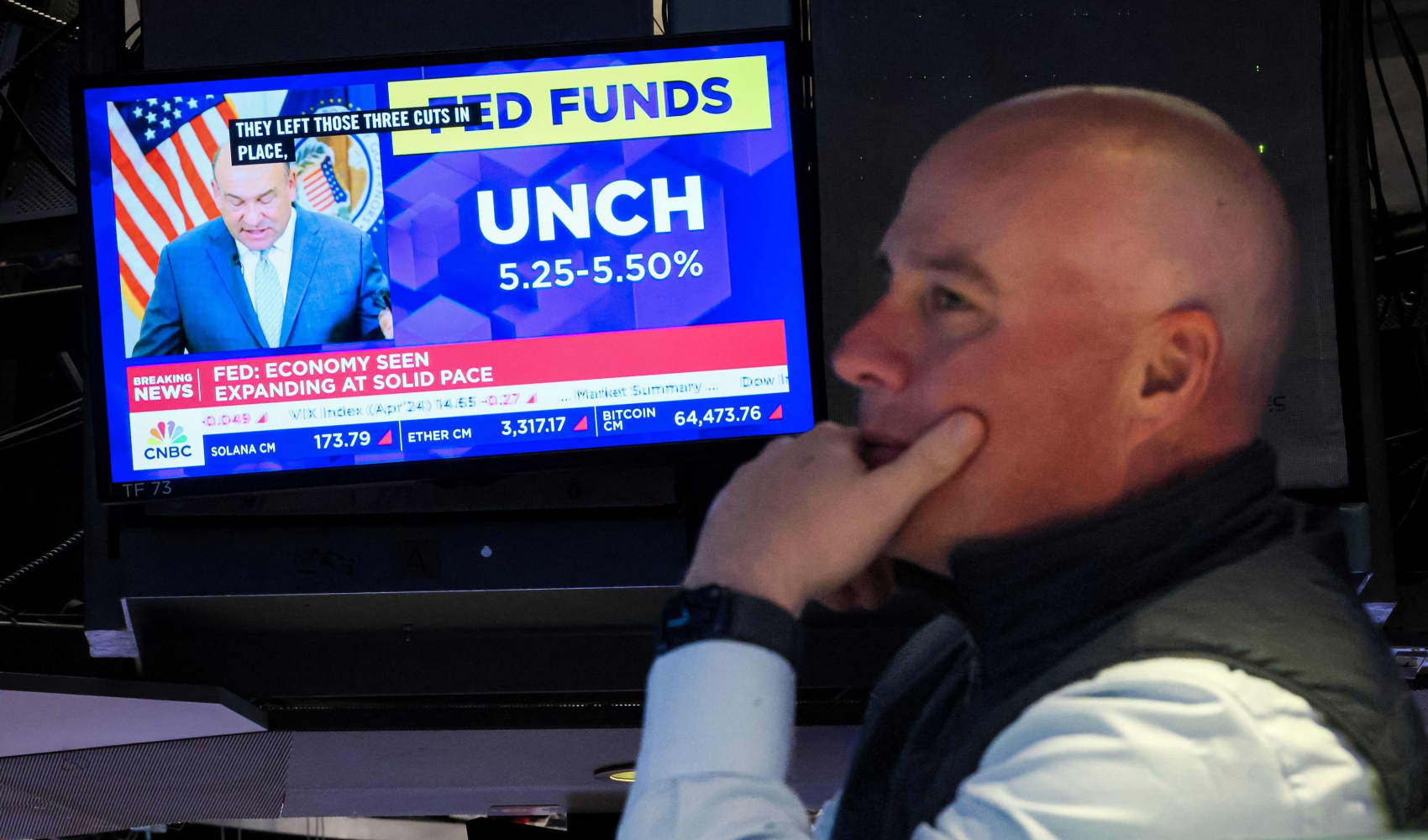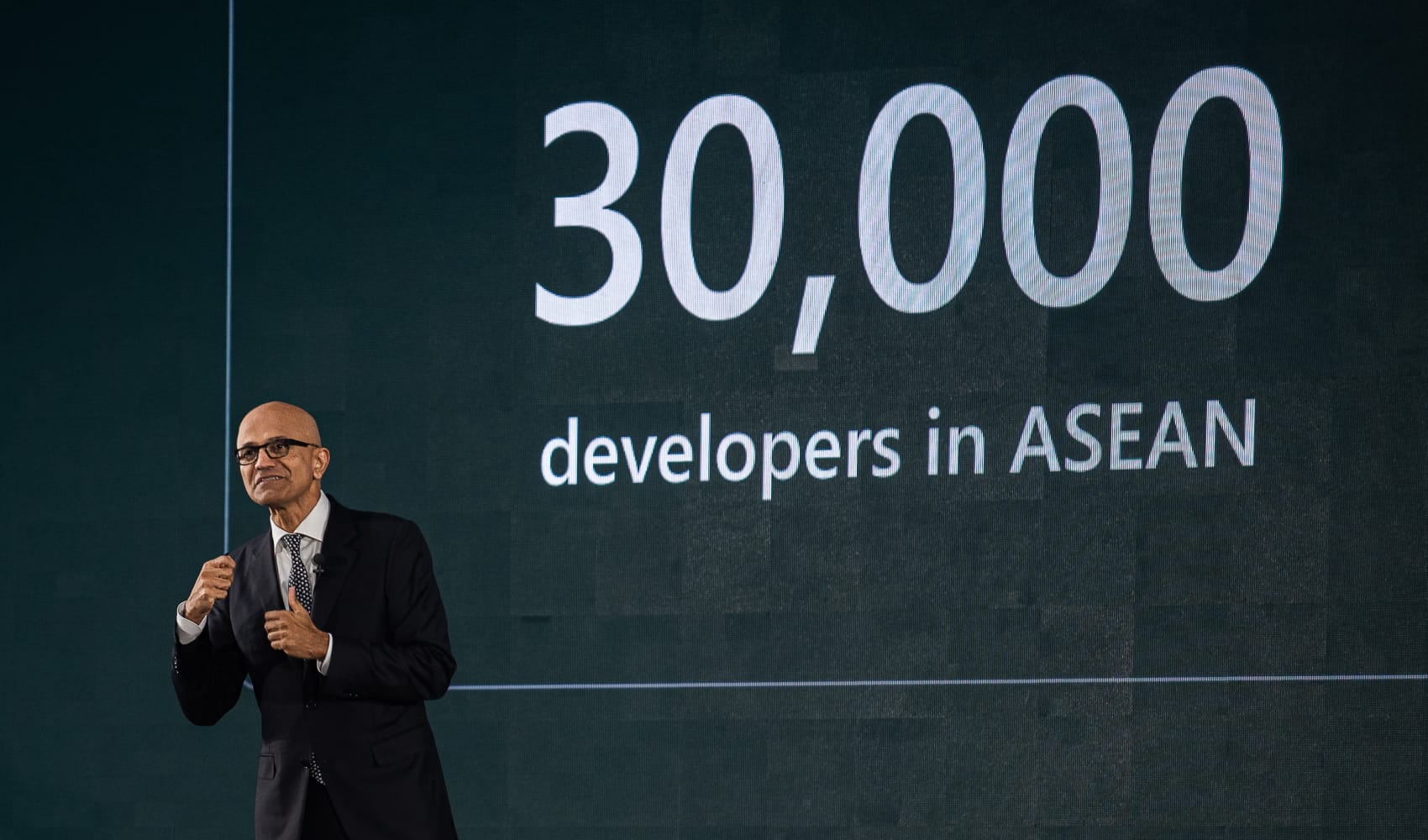
This is CNBC's live blog covering Asia-Pacific markets.
Taiwan's Weighted Index led losses in Asia on Friday, falling 3.81% and closing at 19,527.12, its lowest level in over a month as most major markets in the region fell amid escalating tensions in the Middle East.
Asian equities declined as a person familiar with the matter told NBC News that Israel carried out a limited strike in Iran. Stocks and risk assets tumbled, while safe havens rose.
Gold hit an all-time high as the Japanese yen also strengthened, while bitcoin plunged.
Get Connecticut local news, weather forecasts and entertainment stories to your inbox. Sign up for NBC Connecticut newsletters.
Oil prices jumped more than 3% with global benchmark Brent crude futures crossing $90 a barrel, before easing to just above $88. U.S. stock futures dropped more than 1%, before recovering slightly to about a 0.5% loss.
Japan's Nikkei 225 was down 2.66%, paring earlier losses and ending at 37,068.35, while the broad based Topix fell 1.91% to 2,626.32. On a weekly basis, the Nikkei shed 3.65%.
On Friday, Japan released its March inflation data, with the headline inflation rate coming in at 2.7%, down from the 2.8% seen in February.
Money Report
The core inflation rate — which strips out fresh food prices — stood at 2.6%, in line with expectations from economists polled by Reuters.
South Korea's Kospi was 1.63% lower, finishing at 2,591.86, while the small-cap Kosdaq closed 1.61% lower and 841.91.
In Australia, the S&P/ASX 200 lost 0.98%, ending at 7,567.3 and marking its sixth losing session in seven days.
Hong Kong's Hang Seng index was down 0.95%, while the mainland Chinese CSI 300 slipped 0.79% and closing at 3,541.66.
Overnight on Wall Street, all three major indexes ended mixed, with the S&P 500 posting five straight days of losses, its longest losing streak since last October. The broad index lost 0.22%, while the Nasdaq Composite dropped 0.52%.
The Dow Jones Industrial Average added 0.06%, closing just above its flatline for 2024.
— CNBC's Brian Evans and Alex Harring contributed to this report.
Nissan lowers sales and profit outlook for 2023 financial year
Japanese automaker Nissan lowered its sales and profit outlook for its 2023 financial year ended March 31.
Nissan revealed in a filing it lowered its sales volume estimate to 3.44 million units, down from the 3.55 million forecast in February.
It also slashed its net revenue forecast to 12.6 trillion yen ($81.55 billion) from 13 trillion yen, and its operating profit estimate was cut to 530 billion yen from 620 billion yen.
Net profit is expected to come in at 370 billion yen for fiscal 2023, down from the 390 billion previously projected.
Nissan said the revision is "due to a decrease in sales volume, various cost reliefs made to suppliers such as inflation, and other factors."
— Lim Hui Jie
Shipping firms rally after Israel carries out operation in Iran
Shares of Asian shipping firms rallied after news that Israel carried out an operation in Iran, with explosions reportedly heard near the airport in Isfahan.
Japanese shippers Mitsui Osk Lines climbed 1.81%, while Kawasaki Kisen and Nippon Yusen were up 0.34% and 1.44%.
Hong Kong shipping firms also climbed, with Pacific Basin spiking 8.68%. Cosco Shipping Holdings was up over 4%, and international logistics firm OOIL, which owns Orient Overseas Container Line, climbed 4.5%.
— Lim Hui Jie
Safe haven assets rise after unconfirmed reports of explosions in Iran; gold hits fresh record
Safe haven assets rose following reports of unconfirmed explosions in Iran, with the country's Fars news agency reportedly saying that explosions were heard near the airport at the country's central Isfahan city, but the reason was unknown.
Spot gold prices surged to a fresh all-time high of 2,411.09 per ounce, while the yen strengthened 0.45% to 153.93 against the U.S. dollar.
Prices of bitcoin fell 1.44% to $60,186, according to Coin Metrics data.
— Lim Hui Jie
Oil prices up 3% after reports of explosions in Iran
Oil prices jumped more than 3% after unconfirmed reports of explosions near the Iranian city of Isfahan.
Iran's Fars news agency reported that explosions were heard near the Isfahan airport, but emphasized that the reason was unknown.
Global benchmark Brent traded 2.86% higher at $89.60 a barrel, while the U.S. West Texas Intermediate rose 2.83% to $85.05 per barrel.
—Lee Ying Shan
Australia treasurer says relations with China making good progress
Australia's relationship with China continues to improve on the trade front, according to Treasurer Jim Chalmers.
Beijing ending its tariffs on Australian wine last month, is a good start in mending ties, he added.
"We've made some really good progress when it comes to stabilizing the Australian relationship with China," Chalmers told CNBC's Karen Tso at the IMF spring meetings in Washington on Thursday.
"When we came to office, there was about $20 billion a year in trade restrictions — is now I think from memory less than $1 billion. And wine has been the most recent progress that we've made," he said.
"We want to make sure that our Chinese markets are reliable, we wanted to see these restrictions lifted. And we're very pleased that they were."
Chalmers added Australia will continue to work towards rolling back the remaining Chinese tariffs, such as those on lobster and beef.
— Sumathi Bala
Japan's Nikkei leads losses in Asia, dragged by electronics stocks
Japan's benchmark Nikkei 225 slid as much as 3%, mainly dragged by electronics and manufacturing stocks.
The largest loser on the Nikkei was semiconductor equipment supplier Lasertec, which plunged 7.5%.
Other stocks on the top losers list included counterparts Tokyo Electron, as well as Screen Holdings, which also dropped more than 7%.
— Lim Hui Jie
Japan headline inflation eases to 2.7% in March, core inflation holds steady at 2.6%
Japan's headline inflation rate came in at 2.7% in March, easing from the 2.8% recorded in February.
Core inflation in the country stood at 2.6%, in line with expectations from economists polled by Reuters and down from February's 2.8%.
The so called "core-core" inflation metric used by the Bank of Japan came in at 2.9% from 3.2%, the first time that the index has fallen below 3% since November 2022.
— Lim Hui Jie
CNBC Pro: As India heads to the polls, the pros name 8 top stocks to buy
A growing population, strong consumption levels and a pickup in manufacturing activity have propelled India's economy in the last year — and market watchers are actively seeking out opportunities in the South Asian powerhouse.
India's stock market too, has been booming, pushing economists to say its market capitalization could hit $60 trillion in the next two decades.
It comes as India's mammoth election — with about 970 million registered voters — gets underway, running between Apr. 19 and Jun. 1.
We asked the pros to name sectors — and stocks — in the country to play right now.
CNBC Pro subscribers can read more here.
— Amala Balakrishner
CNBC Pro: Here are the 6 stocks that rise when Nvidia shares fall
Six stocks in the S&P 500 rise often whenever Nvidia shares fall, according to a CNBC Pro analysis.
CNBC Pro screened for stocks in the S&P 500 that are inversely correlated to Nvida's over a month and year period after the stock fell into correction territory for the second time this month.
CNBC Pro subscribers can read more about the six stocks here.
— Ganesh Rao
S&P 500 'modestly oversold,' says Strategas
The recent stock selloff has led to a rise in some oversold signals, according to Chris Verrone, Strategas head of technical and macro research.
Around 30% is currently trading above its 50-day moving average, close to the 20% range "worth targeting in uptrends," he wrote in a Thursday note.
"Yesterday's pop in put/call ratios + the recent increase in "short" S&P ETF volumes have caught our eye as price action begins to affect behavior," Verrone said.
To be sure, market leadership is ultimately more important, he noted. Utilities have notably started to pick up even as rates have risen, which Verrone believes is worth keeping an eye on.
"The more important question on our mind is what character does leadership assume on any bounce and whether the pro-cyclical tone that has been so dominant for much of the last 6 months can resume? Discretionary vs. Staples has consolidated but is borderline oversold… important for this to respond affirmatively over coming weeks," said Verrone.
— Hakyung Kim
Inflation will remain elevated above the Fed's 2% target, MRB Partners says
Wall Street could be mistaken in its hope that a recent uptick in inflation is an irregularity as opposed to a longer and more worrying trend, according to MRB Partners.
"The prevailing consensus is that inflation's recent pickup is an anomaly, and that inflation will return to its low pre-pandemic run-rate ahead," the firm wrote on Wednesday. "The last three CPI reports support MRB's view that the consensus is mistaken."
Instead, inflation will likely run at a 3% to 4% clip, according to MRB. The Federal Reserve's preferred inflation gauge, the personal consumptions expenditures index, will also "reaccelerate later in the year," the firm notes.
"Unlike the Fed and the consensus, we believe that ultimately economic growth matters greatly for inflation," the independent research firm said.
— Brian Evans
Mining stocks rise ahead of the Bitcoin halving
Bitcoin mining stocks rose on Thursday ahead of the imminent "halving" event, which will cut their main stream of revenue in half and is estimated to take place in the next couple of days.
Marathon Digital rose 7%, Riot Platforms gained more than 4% and Iris Energy was up 8%. CleanSpark, which is one of the only miners still up for the year, rallied 13%.
Many of the publicly listed miners have been preparing for it by making big purchase orders for new mining equipment or increasing their electricity capacity and growing their hash rates. Nevertheless, uncertainty ahead of the halving has pressured mining stocks, most of which are down double digits for the year.
While most of the public cryptocurrency miners are positioned to survive the supply shock of the Bitcoin halving, JPMorgan has named its top picks. For more details, read the full story here.
— Tanaya Macheel






